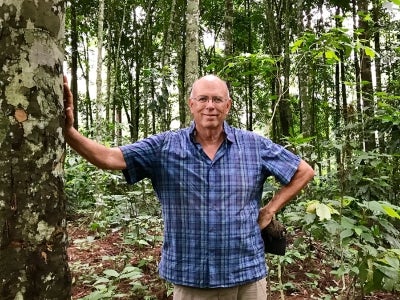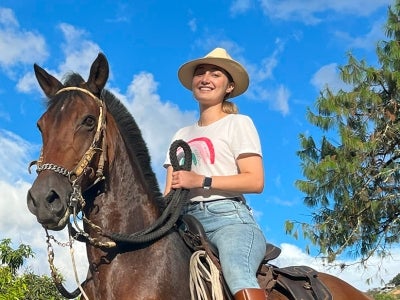
GEF Director of Programs Gustavo Fonseca (center) visiting a sustainable forest management project in Mexico
Gustavo Fonseca is Director of Programs at the Global Environment Facility, one of the world’s largest funders of actions to combat the illegal wildlife trade. In an interview, he addressed the animal origins of the novel coronavirus (COVID-19), the potential power of wildlife trading bans, and the need for greater alignment between science, policy, and environmental action.
What do we know about where COVID-19 came from?
The precise source of the coronavirus is unknown at this stage. The likely natural animal reservoirs for coronaviruses are bats. Prior disease outbreaks, like SARS in 2002-03 and MERS in 2013, are both considered to have originated in bat coronaviruses. Then, the virus jumped to humans via civets and camels, respectively. In the case of COVID-19, the intermediate animal group in the transmission chain is in question. Currently the main focus is on pangolins, which may have become hosts after being infected by bats kept in close quarters in wildlife markets where live animals are sold in China.
What don’t we know?
We don’t know what other wild animals may be transmitting COVID-19, and how it could mutate as it continues to spread through human populations. We learned recently that the virus can infect captive tigers and other felids. Then there’s the question of how climate change could impact COVID-19 and other potential zoonotic pathogens – and more analysis is needed into effects on the physiology and ecology of both reservoirs and intermediate species.
Are wildlife trade bans enough to avert another crisis?
National bans can have significant impact. Take China’s 2017 ban on ivory trade for example: domestic demand for ivory dropped by almost half as a result of the measure, which had the support of 9 out of 10 people in the country. China’s recent ban on the trade and eating of non-aquatic wild animals is similarly very significant and may render similar results by halting the demand that drives trafficking and poaching. However, enforcement of such a broad measure may be difficult given live animal markets are prolific in the country, compared to a limited number of ivory carving shops. The suspension announced in January also does not include trade for fur, medicine, or research, leaving open a legal trade channel that could become the main conduit for trafficking live animals.
How will the coronavirus crisis affect the GEF’s approach to the global wildlife trade?
The Global Wildlife Program, supported by the GEF and led by the World Bank, has focused its attention on the illegal trade of wildlife across international borders, with operations in Africa, Asia, and Latin America. Through this program, whose additional partners include UNDP, UNEP, ADB, and WWF, we are increasingly looking at ways to engage with our member countries and partners about the consumption of wild animal species, and are working to improve human-wildlife coexistence through several initiatives, including through support for wildlife-based economies. The framework we have in place for this program embodies global concerns about the drivers, impacts, and consequences of the illegal wildlife trade, and the need to involve all relevant stakeholders in advancing solutions. As our CEO and Chairperson has said, the GEF is also preparing to bring together a taskforce of scientific experts from across the health and environment disciplines to focus on ways we can prevent infectious diseases through action on the environment – wildlife trade measures will be part of this.
Are there other environmental factors associated with emerging diseases?
We also recognize that deforestation, forest degradation, and increased proximity between human life and animals’ natural habitats are making it easier for people to catch and spread new viruses. Climate change is another destabilizing factor that is affecting the checks-and-balances of nature and raising these risks. Through our Integrated Approach Pilots and Impact Programs, the GEF is working to address the root causes of wildlife habitat loss – including unsustainable agriculture and industrial practices – and we will continue to build on this work to help countries recover from the current crisis and avert future threats.

Right to left: GEF Director of Programs Gustavo Fonseca, GEF CEO and Chairperson Naoko Ishii, and GEF Director of Strategy and Operations Francoise Clottes, on the Tapajos River in the Brazilian Amazon
What life lessons has your work taught you?
I have been fortunate to build a career at the intersection of science, policy, and action, and I believe strongly in the value of strong partnerships across these areas. Most of my academic work was focused on identifying environmental threats and the mechanisms that drive them. While at Conservation International, I proposed actions to deal with the key stressors that cause environmental degradation and biodiversity loss. Leading the GEF’s Global Programming Unit has connected these dots further – guiding financing for projects and programs that are guided by the best available science and that can promote needed policy change. You can’t have effective action without informed policy, and you can’t have informed policy without solid science. It’s that simple.
Global environmental challenges can be overwhelming, particularly when holed up at home. Is there really anything one person or organization can do to move the needle on today’s threats?
Absolutely. We can each have a profound impact in addressing crises – from the coronavirus spread to climate change – if we work together and follow the guidance of scientific organizations and institutions. As social distancing measures are showing, the aggregation of our individual actions is very powerful and can make a difference quickly. It is a difficult time but there is something heartening in that.


